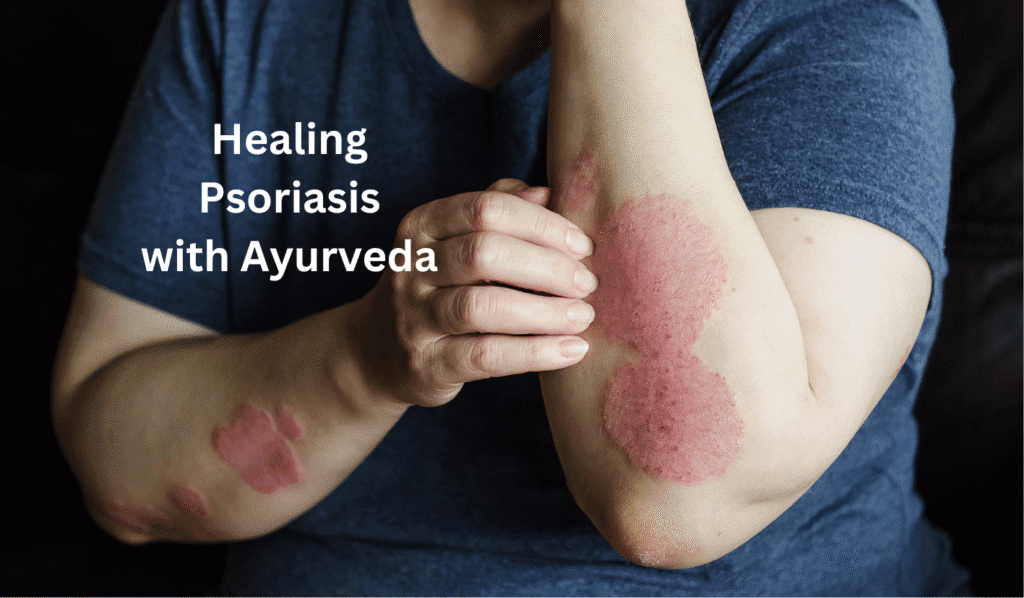Psoriasis is a chronic autoimmune skin condition characterized by red, scaly patches that can cause itching, discomfort, and emotional stress. While modern medicine offers various treatments such as topical creams, systemic medications, and UV therapy to manage symptoms, these often focus on symptom suppression rather than addressing the root cause. Ayurveda, on the other hand, approaches psoriasis from a holistic perspective, emphasizing internal balance and detoxification to not only manage the symptoms but also prevent recurrence. At Shantitheeram Ayurveda, a renowned Panchakarma and Ayurveda center in Kerala, we offer personalized and authentic Ayurvedic treatments for psoriasis, blending ancient wisdom with modern therapeutic approaches to provide comprehensive relief and healing.
Understanding Psoriasis in Ayurveda
In Ayurveda, psoriasis is primarily associated with an imbalance of the doshas, particularly Vata and Kapha, combined with the accumulation of Ama (toxins) in the body. Psoriasis can be categorized under Kushta, which refers to a group of skin disorders. The imbalance in Vata dosha leads to dryness and scaling of the skin, while Kapha imbalance contributes to thickening and itching. Additionally, an impaired digestive system (Agni) results in the formation of toxins (Ama) that accumulate in the tissues, further aggravating the condition.
Causes of Psoriasis in Ayurveda:
- Improper diet: Excessive intake of incompatible foods (Viruddha Ahara) like dairy with fish or oily, heavy foods can disrupt the balance of doshas.
- Stress and emotional imbalances: Mental stress, anxiety, and emotional turmoil are significant contributors to psoriasis.
- Improper lifestyle: Sedentary habits, lack of physical activity, and an irregular daily routine can lead to dosha imbalances.
- Suppressed natural urges: Holding back natural urges like thirst, hunger, or the need to eliminate wastes can lead to dosha aggravation.
- External factors: Environmental pollution, chemical exposure, and the use of harsh skincare products can trigger psoriasis flare-ups.
Ayurvedic Treatment Approaches for Psoriasis at Shantitheeram Ayurveda
At Shantitheeram Ayurveda, we believe in a personalized approach to healing, tailoring treatments based on each individual’s constitution (Prakriti), the severity of their condition, and their specific dosha imbalances. Our treatments for psoriasis are designed to detoxify the body, pacify aggravated doshas, and restore the balance between body, mind, and soul. We emphasize internal and external therapies, a dosha-specific diet, lifestyle modifications, and stress management practices to provide comprehensive care.
1. Panchakarma Detoxification Therapies
Panchakarma, the cornerstone of Ayurvedic healing, is a powerful detoxification process that helps remove toxins (Ama) from the body, balance the doshas, and rejuvenate the skin and overall health. At Shantitheeram Ayurveda, our Panchakarma therapies for psoriasis are customized to each patient’s unique needs.
a. Vamana (Therapeutic Vomiting)
Vamana is a controlled emesis therapy used to eliminate excess Kapha from the body. In the case of psoriasis, Vamana is highly effective in clearing the accumulated toxins and reducing Kapha dosha, which is responsible for the thickening of skin plaques. Vamana also helps improve digestion and metabolism, which plays a crucial role in preventing the formation of Ama.
b. Virechana (Purgation Therapy)
Virechana is a therapeutic purgation therapy that helps eliminate excess Pitta and toxins from the body, particularly through the digestive tract. Since psoriasis involves an imbalance in Pitta, which is responsible for skin inflammation, Virechana helps reduce redness, itching, and burning sensations associated with psoriasis. It also supports the purification of the blood, which is essential for healthy skin.
c. Rakta Mokshana (Bloodletting)
Rakta Mokshana is a specialized therapy used to purify the blood. Since psoriasis is often linked to toxins in the blood, this therapy helps in removing these impurities, thereby improving skin health. Methods such as leech therapy or the use of herbal preparations are employed depending on the individual’s condition. Bloodletting reduces inflammation, calms the aggravated Pitta, and provides relief from skin symptoms.
d. Snehana and Swedana (Oleation and Fomentation)
Snehana (internal and external oiling) and Swedana (herbal steam therapy) are important preparatory steps in Panchakarma. Snehana helps in softening the tissues and mobilizing toxins, while Swedana opens up the channels, promoting the elimination of Ama. These therapies also help in reducing dryness, scaling, and itching of the skin, providing immediate relief to psoriasis patients.
2. Herbal Medications and Internal Treatment
In Ayurveda, internal medications play a significant role in treating psoriasis by addressing the root cause of the condition—dosha imbalances and toxin accumulation. At Shantitheeram Ayurveda, we use a variety of herbal formulations to detoxify, balance the doshas, and nourish the skin.
a. Neem (Azadirachta indica)
Neem is known for its potent anti-inflammatory, antibacterial, and blood-purifying properties. It is highly effective in treating skin conditions like psoriasis. Neem helps reduce itching, inflammation, and scaling while purifying the blood and supporting overall skin health.
b. Manjishtha (Rubia cordifolia)
Manjishtha is another powerful blood purifier used in Ayurvedic treatment for psoriasis. It helps eliminate toxins from the body, promotes skin healing, and reduces redness and inflammation. Manjishtha is particularly effective in cases of psoriasis where Pitta dosha is aggravated.
c. Khadira (Acacia catechu)
Khadira is known for its ability to detoxify the blood and cleanse the skin. It is often used in Ayurvedic formulations for skin disorders, especially psoriasis, due to its anti-inflammatory and healing properties. It helps reduce scaling and promotes healthy, clear skin.
d. Turmeric (Curcuma longa)
Turmeric, rich in curcumin, has powerful anti-inflammatory and antioxidant properties that help reduce the severity of psoriasis symptoms. It works by calming aggravated doshas, especially Pitta and Kapha, and supports skin regeneration and repair.
e. Triphala
Triphala is a traditional Ayurvedic combination of three fruits—Amalaki, Haritaki, and Bibhitaki—that works as a mild detoxifying agent. It supports healthy digestion, elimination of toxins, and purification of the blood, all of which are essential for managing psoriasis.
f. Guggulu (Commiphora mukul)
Guggulu is known for its anti-inflammatory and detoxifying properties. It helps balance Vata and Kapha doshas, reduces joint pain associated with psoriatic arthritis (a condition that sometimes accompanies psoriasis), and promotes healthy skin.
3. External Therapies and Applications
In addition to internal treatments, external applications of medicated oils, pastes, and lepas (herbal packs) are used to provide direct relief to the affected areas. These therapies help soothe itching, reduce scaling, and promote the healing of the skin.
a. Takradhara (Buttermilk Therapy)
Takradhara is a soothing external therapy where medicated buttermilk is poured over the head or affected areas. It helps pacify aggravated Pitta, calm the mind, and reduce stress, which is often a trigger for psoriasis flare-ups. Takradhara also helps reduce skin inflammation and itching.
b. Kshalana (Herbal Wash)
Herbal decoctions and medicated water are used to gently wash the affected skin, promoting healing and reducing scaling. Herbs like neem, turmeric, and khadira are often used for their purifying and anti-inflammatory properties.
c. Lepana (Herbal Paste Application)
Lepana involves the application of herbal pastes directly to the skin. These pastes are made from anti-inflammatory, cooling, and healing herbs that help reduce redness, itching, and flaking of the skin. Lepana is an effective therapy for soothing irritated skin and promoting regeneration.
d. Oil Massage (Abhyanga)
Abhyanga with medicated oils like neem oil, coconut oil, or sesame oil helps to moisturize the skin, reduce dryness and scaling, and pacify Vata dosha. The oils penetrate deeply into the skin, providing nourishment and promoting healing from within.
4. Dietary and Lifestyle Modifications (Pathya-Apathya)
In Ayurveda, diet and lifestyle play a critical role in managing psoriasis. At Shantitheeram Ayurveda, we provide personalized dietary guidelines to support the healing process and prevent the recurrence of psoriasis symptoms.
a. Anti-inflammatory Diet
Patients are encouraged to consume foods that balance Vata and Pitta doshas and avoid inflammatory foods. A diet rich in fresh fruits, vegetables, whole grains, and healthy fats (like ghee and sesame oil) is recommended. Spices such as turmeric, cumin, and coriander can be included to support digestion and reduce inflammation.
b. Avoid Incompatible Foods
Ayurveda emphasizes avoiding incompatible food combinations (Viruddha Ahara) that can lead to toxin formation and dosha imbalances. For psoriasis patients, dairy products combined with fish or sour foods should be avoided, as they can aggravate the condition.
c. Hydration and Digestion
Staying well-hydrated is essential for maintaining healthy skin and preventing dryness. Patients are encouraged to drink herbal teas, such as those made from coriander, fennel, or ginger, to support digestion and detoxification.
d. Stress Management
Stress is a known trigger for psoriasis, and managing mental health is key to preventing flare-ups. Practices like yoga, meditation, and pranayama (breathing exercises) are integrated into the treatment plan at Shantitheeram Ayurveda to promote relaxation, reduce stress, and support overall well-being.
Conclusion
Psoriasis is a complex condition that requires a holistic approach to treatment, addressing not only the symptoms but also the root causes. At Shantitheeram Ayurveda, our personalized Ayurvedic treatments offer a natural and effective solution for managing psoriasis. By balancing the doshas, detoxifying the body, and promoting overall health and well-being, Ayurveda provides long-term relief and improves the quality of life for those suffering from psoriasis.

